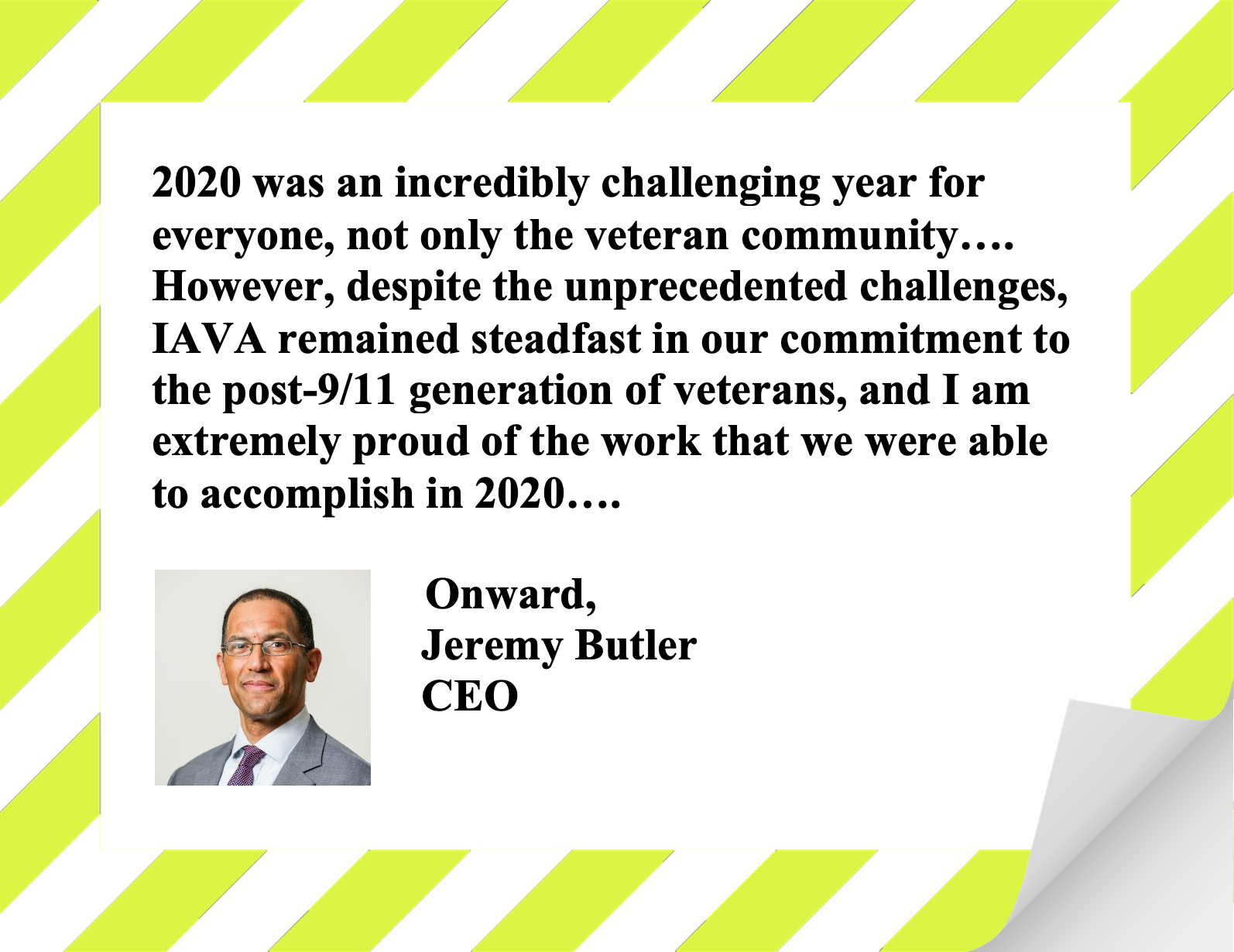IAVA's Policy Agenda for the 117th Congress
Combat Suicide among Troops and Veterans
Campaign to Combat Suicide among Troops and Veterans
For nearly a decade, IAVA and the veteran community have called for immediate action by our nation’s leaders to combat the crisis of 20 servicemembers and veterans dying every day from suicide. In the last two years, we made significant strides towards addressing this epidemic.
2020 was a groundbreaking year in mental health and suicide prevention. The passage of the IAVA-backed Commander John Scott Hannon Veterans Mental Health Care Improvement Act will result in critical reforms in how America combats the suicide crisis. Key provisions of this legislation will include the creation of a community grant program to help identify isolated veterans and provide mental health services, which is modeled after the extremely successful Supportive Services for Veteran Families (SSVF) program. These targeted programs are designed to identify the 14 veterans per day who die by suicide but are not currently participating in VA services and connect them to lifesaving resources. Additionally, this legislation will expand VA’s tele-health services at a time when veterans may be feeling more disconnected than ever before. These are critical improvements to VA care. But the work is not done.
According to the most recent VA data, the youngest cohort of veterans, post-9/11 veterans aged 18 to 34, have the highest rate of suicide. And while not always an indicator of suicide, mental health injuries continue to disproportionately impact the post-9/11 generation. In our latest member survey, a stunning 65% of IAVA members reported service-connected PTSD and over half reported anxiety (58%) or depression (56%). Meanwhile, the nation and VA struggle to keep up with the demand for mental health care and mental health care providers such as psychiatrists and psychologists, both of which are in the top 5 for VA staffing shortages.
Over the past few years, there has been much progress made in the realm of suicide prevention and mental health. The VA, DoD, and DHS’ plan for transitioning service members targets those in the post-9/11 generation at increased risk of suicide to engage with them before the moment of crisis. VA has leveraged tele-mental health care to expand its reach and predictive analytics to target the top 0.1% of veterans at risk for suicide. These reforms are critical to addressing the suicide crisis and IAVA remains dedicated to combating suicide.
IAVA's Approach
Improve Access to Quality Mental Health Care
Improve Access to Quality Mental Health Care
The expansion of telemental health care, extending access to those with “other than honorable” discharges, and the investment in research are just some of the advancements in mental health care access and quality over the past few years. Access to VA mental health care has never been easier. However, it is important that we continue the momentum and continue to improve on the quality and ease of access to mental health care both within VA and in the medical community at large.
Telehealth care will remain a crucial tool during and after the COVID-19 pandemic is over. These lifesaving tools will continue to play an important role in healthcare delivery not only for rural veterans, but all veterans. We must ensure that the best practices and techniques learned through the pandemic remain in place.
IAVA's Recommendations
- Ensure that all veteran populations have access to quality and timely mental health care, regardless of discharge status, combat experience, or component
- Ensure that all mental health care providers throughout the United States have access to and are aware of veteran cultural competency training
- Call on VA to ensure all community care providers are held to the same competency and quality standards of VA providers and to monitor the quality of service and patient satisfaction among veterans who use community care
- Expand tele-mental health care for veterans to include expanding telemental health care coverage across medicare and medicaid providers and private insurance companies
- Encourage VA to support and expand scholarship and loan forgiveness programs for mental health professionals
- Move VA psychologists under the Hiring Authority, Title 38, rather than the federal GS pay scale which would provide a salary competitive to the private sector
- Ensure those with mental health injuries related to military sexual trauma have access to timely, quality, specialized care in accordance with their unique needs
- Invest in complementary and alternative therapies for mental health injuries that show evidence of positive outcomes
- Ensure that there are standard complementary and alternative therapies available at every VA medical facility nationwide
IAVA's Policy Priorities
Select a topic from the list below to learn about IAVA’s policy recommendations for the 117th Congress.

